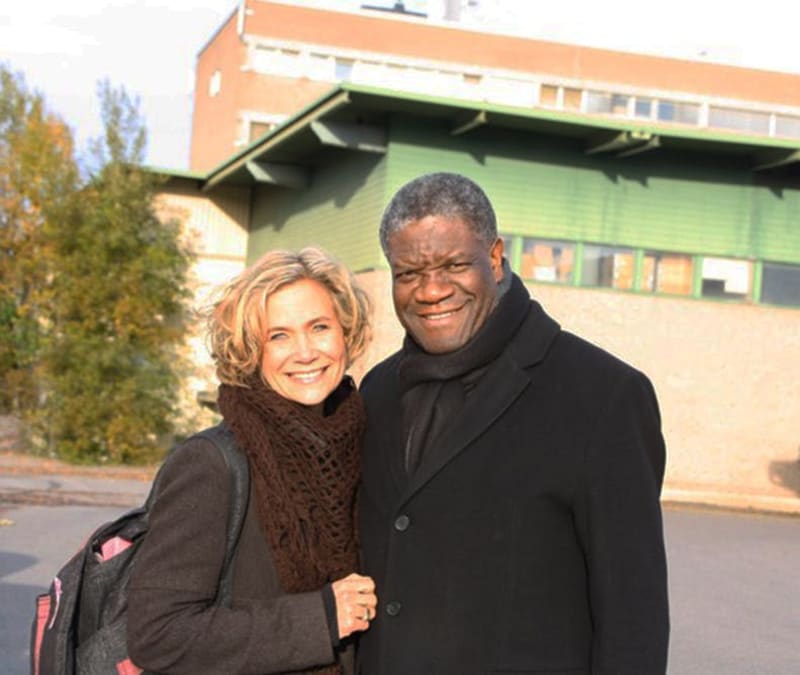
News Summary 2018
The year ended in a fantastic way: in December 2018, Dr Denis Mukwege was awarded the Nobel Peace Prize for his work against sexual violence. He has been a mentor to Yennenga Progress ever since we were founded in 2006.
We now summarize 2018’s activities and are delighted with the fantastic platform this gives us to reach new heights during 2019.
The year ended in a fantastic way: in December 2018, Dr Denis Mukwege was awarded the Nobel Peace Prize for his work against sexual violence. He has been a mentor to Yennenga Progress ever since we were founded in 2006.
Fittingly, the expansion of the health center in the village Nakamtenga, which is called the Dr Denis Mukwege Center, got finished this year. In 2019, we plan to expand both the dental clinic and the maternity ward. The health center is based on Dr Mukweges model for holistic health, which assumes that medical treatment alone is not sufficient to help a person recover. Other important prerequisites are mental health, legal support (compliance with human rights) and the capacity for sustenance. Dr Mukwege’s health model also emphasizes the fact that violence against women is one of the world’s largest but most silent disasters. It is a disaster that needs to be addressed in a systematic and targeted way. Dr Mukwege’s assistant Mr Lubala visited our operation in Nakamtenga in December to inspire local staff and also be inspired by their work.
The team of teachers in the village continues to be dedicated and goal-oriented. Yennenga’s Swedish teacher-trainer has been able to be on-site and work closely with the group. This presence and direct coaching provides important moral support for our school’s methods, which strongly deviate from the traditional public system. The presence also provides important input in the continued development of the work.
We have also started a junior high school this year! This means that we now have six subject teachers who previously have not worked according to our pedagogy. This requires an extra effort from our principal, to ensure that teaching methods applied are in Yennenga spirit. The three key areas in our teaching method are: student affinity, activity creation and language development. This forms the foundation for teaching in all subjects from preschool to junior high school.
At the school start, some difficulties arose in the junior high school class. The class moving up from middle school consisted of 18 students, and the village chose to fill it in to get closer to our limit of 30 students per class. The 18 students which had already spent nine years with us (from preschool) were then mixed with the 11 students that have attended local schools, with significantly lower levels of knowledge. When the students did diagnostic tests in French, the results for our old students were 14 points and above (of 20 points in total), and for the new students the results were 2 points and below. After crisis meetings and many pedagogical talks led by our principal, the results have been improving during the fall: now all the new students’ results are around 9-10 points. We acknowledge our team of teachers for this improvement and are hopeful that all students will soon reach a sufficient level.
During the fall, we also started evening classes for the adults in the village. The majority of adults in the rural areas of Burkina Faso have only attended school for a few years, if at all. We now have 58 adult students that ambitiously attend classes in the evenings and pick up where they left off many years ago. Some are even starting from scratch, from the 1st to the 9th grade!
Harvests during the growing season of 2017 were catastrophically bad. Therefore, the grain storages for most of the people in the village were empty already by February 2018. Acquiring food for another eight months before the next harvest became a nightmare. Yennenga invests in food security through improved agricultural methods and drip irrigation. But the investments are too long-term to solve famine here and now. Thanks to an unexpected contribution from a donor, Yennenga Progress was able to finance the purchase of grain in July which was distributed to families in the village during the same month. This contribution came at the right time to be able to distribute all the grain that they needed during the last months before the new harvest in October. Fortunately, that harvest was much better.
The food shortage confirmed how crucial it is to work with food security issues in Burkina Faso - a country where climate change and depleted soil makes it harder to obtain sufficient harvest to satisfy the families’ needs.
We conclude this report with a highlight for the village: our floorball youth teams. They were selected to be a part of both the women’s and men’s national team in floorball, and participated in the first African floorball championship which was held in Ivory Coast in September. The women’s team won and the men’s team came in second. This resulted in both meetings with Burkina Faso’s king Magho Naaba and first-page articles in the country’s largest newspapers!
In short: an eventful and successful year!
